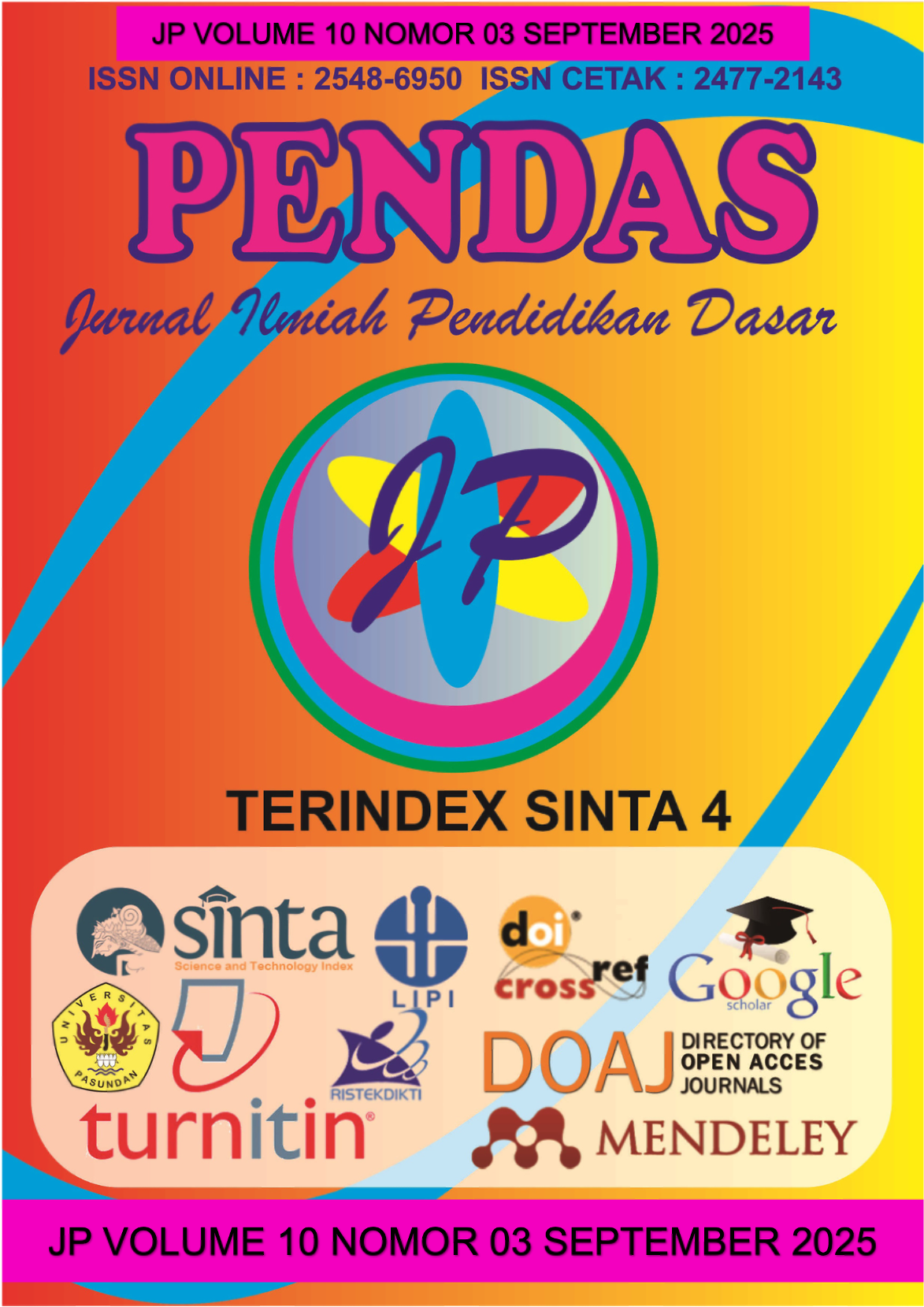PENERAPAN MODEL EDUTAINMENT MENINGKATKAN HASIL BELAJAR DI MTs PONPES MDIA BONTOALA MAKASSAR
DOI:
https://doi.org/10.23969/jp.v10i03.31606Keywords:
Edutainment Model, Learning Outcomes, Al-Qur'an HadithAbstract
This study aims to describe the application of the edutainment learning model in
improving student learning outcomes in the Al-Qur'an Hadith subject in class VIII
MTs Pondok Pesantren MDIA Bontoala Makassar. This study is a Classroom Action
Research (CAR) which is carried out in two cycles, each consisting of two meetings.
The research subjects are 35 students of class VIII. Data collection techniques used
include observation, interviews, tests, and documentation. Data analysis is done by
calculating the percentage and average value (Mean) to measure student activity
and the completeness of learning outcomes. The results of the study show a
significant increase in students' reading ability from pre-cycle to cycle II. In the pre-
cycle, the average value of students is only 48 (less) with a percentage of
completeness of 34.28%. After the application of the edutainment method, in cycle
I the average value increased to 70.28 (good) with a percentage of completeness
of 68.57%. Improvement continued in cycle II, where the average student score
reached 84.57 (very good) with a completion percentage of 85.71%. This finding
indicates that the implementation of the edutainment learning model is effective in
improving student learning outcomes in the Al-Qur'an Hadith subject.
Downloads
References
rab.” ALSUNIYAT: Jurnal
Penelitian Bahasa, Sastra, Dan
Budaya Arab 2(1):58–68. doi:
https://doi.org/10.17509/alsuniyat
.v2i1.24072.
Maritsa, Ana, Unik Hanifah Salsabila,
Muhammad Wafiq, Putri Rahma
Anindya, and Muhammad Azhar
Ma’shum. 2021. “Pengaruh
Teknologi Dalam Dunia
Pendidikan.” Al-Mutharahah:
Jurnal Penelitian Dan Kajian
Sosial Keagamaan 18(2):91–100.
doi: 10.46781/al-
mutharahah.v18i2.303.
Mukhlisah, R., Mustamin Mustamin,
and Muh Azhar. 2025.
“Penerapan Model Pembelajaran
Edutainment Dalam
Meningkatkan Hasil Belajar
Siswa Di MTsN 1 Kota
Makassar.” Al-Qalam: Jurnal
Kajian Islam Dan Pendidikan
17(1):206–14. doi:
qalam.v17i1.3776.
Nurdianti, Rizky, Idam Ragil Widianto
Atmojo, and Sularmi Sularmi.
2020. “Penerapan Metode
Edutainment Berbasis Guided
Discovery Learning Untuk
Meningkatkan Keterampilan
Menyimpulkan Pada
Pembelajaran IPA Kelas III
Sekolah Dasar.” JPI (Jurnal
Pendidikan Indonesia): Jurnal
Ilmiah Pendidikan 6(2):29–36.
doi:
https://doi.org/10.20961/jpiuns.v6
i2.43390.
Pristiwanti, Desi, Bai Badariah, Sholeh
Hidayat, and Ratna Sari Dewi.
2020. “Pengertian Pendidikan.”
Jurnal Pendidikan Dan Konseling
(JPDK) 4(6):7911–15. doi:
https://doi.org/10.31004/jpdk.v4i6
.9498.
Rahmawati, Rafika Dian, Yayuk
Sumarni, Roni Subagya,
Choiriyah Widyasari, and
Ernawati. 2024. “Pengembangan
Kognitif Siswa Sekolah Dasar
Melalui Strategi Pembelajaran
Edutainment.” Didaktik: Jurnal
Ilmiah PGSD STKIP Subang
10(4):242–56. doi:
https://doi.org/10.36989/didaktik.
v10i04.3587.
Sa’adah, Safa Amaliatus, Aris Aris,
and Ratna Puspitasari. 2022.
“Pengaruh Metode Edutainment
Terhadap Hasil Belajar Siswa
Pada Mata Pelajaran IPS.”
Publikasi Berkala Pendidikan
Ilmu Sosial 2(1):1–10. doi:
Downloads
Published
Issue
Section
License
Copyright (c) 2025 Pendas : Jurnal Ilmiah Pendidikan Dasar

This work is licensed under a Creative Commons Attribution 4.0 International License.














































